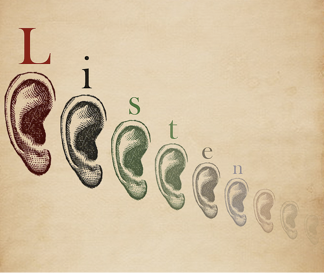Five-time ted.com speaker and leading sound expert Julian Treasure says our “we don’t want poetry, we want sound bites” attitude is a big part of humanity losing its ability to consciously listen. It is hard to listen carefully in a noisy world, and we grow less able to pay attention to the quiet, the subtle, the understated.

In a talk he gave in 2011, Treasure says our “we don’t want poetry, we want sound bites” attitude is a big part of humanity losing its ability to consciously listen. It is hard to listen carefully in a noisy world, and we grow less able to pay attention to “the quiet, the subtle, the understated.”
Consider the humble beginnings of the art of listening, when families or tribes would gather around the hearth or campfire, telling stories about everything – creation myths, tribal or social rules, and the latest goings on in the community. Everyone paid close attention to the storyteller, because in some instances, what you failed to hear could mean your last meal was as the main course for a saber-toothed tiger.
Flash-forward thirty million years or more and we’ve invented recordings, which downgrade the need for accurate listening, and replaced conversation (“dangerously,” as Treasure says) with personal broadcasting. Is it any wonder no one is really listening?
It’s worth taking the seven minutes to listen to the Ted Talk, and consider the five exercises Treasure proposes.
One is “The Mixer,” in which you attempt to identify as many different sound channels as you can hear. In the grocery store line today, I heard – simultaneously, but still separately – conversations at two other check-out lines, the hum of the refrigeration units, the sliding entry doors opening and closing, and squeaky wheels on at least one cart. According to Treasure, the ability to isolate specific sounds within the larger cacophony of sounds improves the quality of your listening and the amount of important information you retain. He also suggests we spend a minimum of three minutes each day in total silence – or as close to it as we can get.
Treasure’s final message is that we must listen consciously in order to live fully in space and time.
How much space, and how much time, are you willing to give to conscious listening?